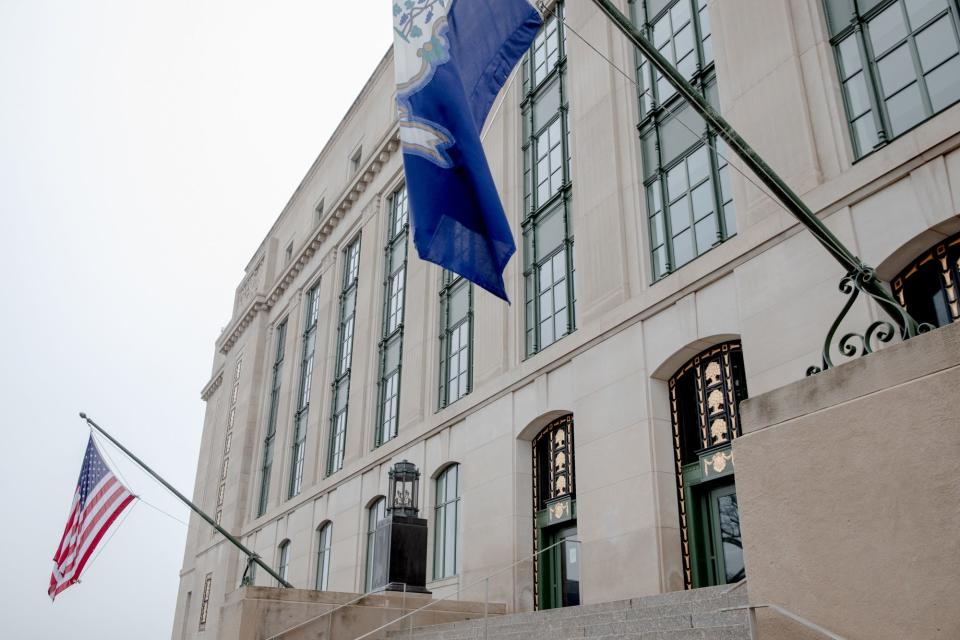Connecticut residents can search online to see if state owes them money
Every year, the state of Connecticut sweeps up millions of dollars in uncashed checks, forgotten insurance policies and long-ignored investments with the promise of seeing that so-called unclaimed property safely returned to its owners through a state program.
Residents can search an online database to find out whether the state owes them money, and Treasurer Erick Russell’s office, which runs the program, has begun automatically mailing checks as well.
Here’s what to know about Connecticut’s unclaimed property program, which was recently reformed following CT Mirror reporting.
How does the state collect unclaimed property?
The state treasurer seizes cash, checks, bonds, stocks, deposits, dividends, and insurance proceeds.
Banks, utilities, insurance companies and other businesses are all required to turn over those assets to the state if they lose track of the individual or entity the money belongs to for more than three to five years.
Last year, the state collected roughly $188 million in unclaimed property and returned roughly $72 million of it during the 2023 fiscal year.

What does the state do with the money that remains in its possession?
Connecticut legislators use some of the money to help pad the state’s general fund each year. Over the past two decades, state lawmakers redirected more than $1 billion from the unclaimed property program to help supplement that annual budget. It provided a $96 million cushion for lawmakers during the 2021 legislative session alone.
And since 2006, the leftover cash from the unclaimed property program has served as the financial backbone for Connecticut’s public campaign finance system.
Candidates for the legislature, governor and state treasurer have all relied on money collected through the unclaimed property program to fund their runs for office over the past 16 years.
In all, roughly $219 million in unclaimed property was spent on the grants that are handed out to political candidates to finance their campaigns.
The state is still on the hook for that debt.
More: City of Norwich owed money City of Norwich owed thousands of dollars in unclaimed money, according to state list
Is there a time limit on when people can collect their money?
No. Owners or their heirs can collect money at any time.
How do I find out if I have unclaimed property?
The program has traditionally required individuals to locate their missing assets on a state website, known as the CT Big List, and to file a formal claim with the treasurer’s office.
And the Treasurer’s office recently began automatically returning any assets valued below $2,500 — if the state could confirm the identity and addresses of the rightful owners.
What were the recent reforms to Connecticut’s unclaimed property program?
The Connecticut Mirror published a story in early 2022 that highlighted how the unclaimed property program returned less than 37% of the money it required banks, utilities, insurance companies and other financial institutions to turn over to the state during the course of two decades.
That investigation also revealed that the Treasurer’s office had failed to disclose millions of checks, refunds and other assets that were valued under $50 on the CT Big List, making it next to impossible for people to recognize the state was in possession of their money.
As a result of that reporting, state officials sought to reform parts of the program in order make it easier for people to identify and recover the money that belongs to them.
Shawn Wooden, who served as treasurer through 2022, dropped the requirement that every claim submitted to the state be notarized, and state legislators changed the law to require every piece of unclaimed property to be added to the CT Big List, no matter what the value of those assets are.
The legislature also gave the Treasurer’s office the authority to automatically return any assets valued below $2,500.
Original reporting by Andrew Brown and compiled by Gabby DeBenedictis. Copyright 2023 © The Connecticut Mirror (https://ctmirror.org).
This article originally appeared on The Bulletin: Conn. unclaimed property: Checks, insurance policies, investments

